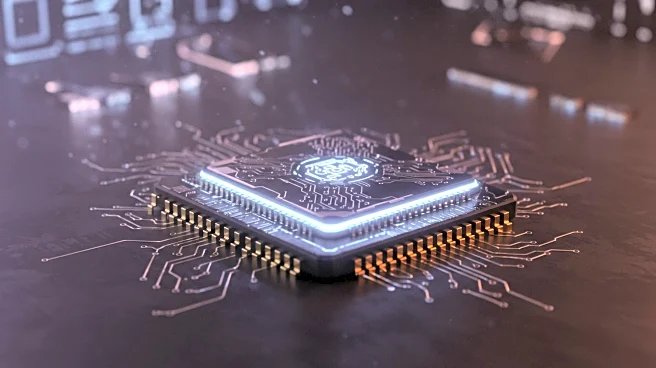What is the story about?
What's Happening?
Nvidia is working on a new AI chip for China, based on its Blackwell architecture, which is expected to outperform the current H20 model. This development comes after President Trump suggested the possibility of allowing more advanced Nvidia chips to be sold in China, although U.S. regulatory approval remains uncertain due to concerns about China's access to U.S. AI technology. The new chip, tentatively named B30A, will feature a single-die design, high-bandwidth memory, and NVLink technology for fast data transmission. Nvidia plans to deliver samples to Chinese clients for testing soon, but the chip's specifications are not yet finalized.
Why It's Important?
The development of a new AI chip by Nvidia for China is significant in the context of ongoing U.S.-Sino trade tensions, particularly concerning technology and AI. China accounts for 13% of Nvidia's revenue, making it a crucial market for the company. However, U.S. legislators are concerned that even scaled-down versions of advanced AI chips could hinder U.S. efforts to maintain its lead in AI technology. Nvidia argues that retaining Chinese interest in its chips is essential to prevent developers from switching to competitors like Huawei, which is advancing in chip development.
What's Next?
Nvidia is preparing to deliver a separate new China-specific chip based on its Blackwell architecture, designed primarily for AI inference tasks. This chip, dubbed RTX6000D, is expected to sell for less than the H20 due to weaker specifications and simpler manufacturing requirements. It is designed to comply with U.S. government restrictions, using conventional GDDR memory and featuring memory bandwidth just below the threshold established by recent restrictions. Nvidia plans to deliver small batches of RTX6000D to Chinese clients in September.
Beyond the Headlines
The development of new AI chips for China by Nvidia highlights the complex interplay between technological advancement and geopolitical considerations. As U.S.-Sino trade tensions persist, companies like Nvidia must navigate regulatory challenges while maintaining market share in China. The situation underscores the broader implications of technology access and control in international relations, with potential impacts on innovation and competition in the AI sector.















